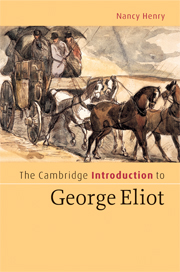Chapter 3 - Literary influences
Published online by Cambridge University Press: 05 September 2012
Summary
As we have seen, before and after Mary Anne Evans became George Eliot, reading was an essential part of her life. The fact that she read more widely than any other Victorian novelist – as well as the often densely allusive nature of her writing – means that identifying the major “influences” on her work is particularly complex and challenging. In recent years literary critics have tended to approach the connections between literary works as questions of “intertextuality,” detecting linguistic similarities that reflect broader cultural discourses. When attempting to understand Eliot's writing in the context of her life and times, the more literal notion of influence can be a useful part of that historical contextualization. This chapter will concentrate on a set of literary texts that pervade her writing and implicitly or explicitly influenced both its style and content.
Eliot gained proficiency in Greek and Latin – a notable accomplishment for a woman who could not attend the universities where young men pursued their studies of classical languages and texts. It is not surprising then that she made the exclusion of a girl from a classical education and the folly of force-feeding Latin to a boy central to the first book of The Mill on the Floss. In trying to explain the psychological harm inflicted on Tom Tulliver by Mr Stelling's insistence that he swallow an uncongenial and impractical curriculum of geometry and Latin, Eliot's narrator tells us that Tom was as uncomfortable “as if he had been plied with cheese in order to remedy a gastric weakness which prevented him from digesting it” (Mill, II:1).
- Type
- Chapter
- Information
- The Cambridge Introduction to George Eliot , pp. 30 - 40Publisher: Cambridge University PressPrint publication year: 2008



